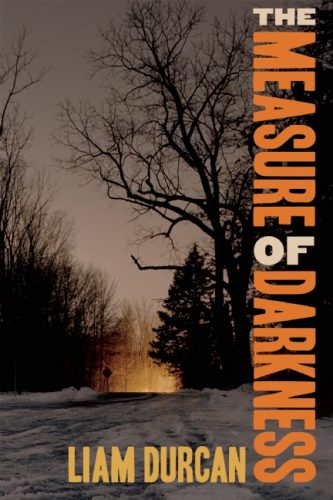
The Measure of Darkness, by Liam Durcan, Bellevue Literary Press, 2016, 251 pages
The Measure of Darkness, as the title might suggest, plumbs the darkness into which a man has fallen after emerging from a brain injury. Acclaimed architect Martin Fallon is hit by a snowplow as he drives to the Eastern Townships in Québec. When he awakens from his coma, his caregivers, family and colleagues realize that he suffers from “neglect syndrome” which makes a person unable to perceive the left side of his visual world. Martin, like other victims of this deficit, is unaware of his condition. However, as the weeks in a rehabilitation centre unfold, he slowly realizes the extent of his existential losses: he has lost his professional licence; his colleagues have ousted him from the company he founded; his two ex-wives have disowned him; one of his daughters has turned her back on him, and his other daughter hasn’t quite found a way to approach him. The only person who stands by him, ironically enough, is his estranged elder brother who returns to nurse him after a thirty-year absence.
Martin’s thoughts move from present to past, with side-detours into fantasy, portrayed with a deftness that is a credit to the author’s skill as a writer and his deep understanding of the human brain/mind connection as a neurologist. It is from Martin’s paranoid meanderings that we learn that he landed in Montréal as a draft-dodger; that his elder brother fought in Vietnam and returned a broken man; that his own parents abandoned the marginalized minorities that had sustained them in Detroit, when the going got rough, and that he himself had, in a sense, abandoned his family for his career. In his post-trauma life he tries to cope by drawing a parallel between himself and his mentor Konstantin Melnikov, a renowned Soviet-era architect who retreated into obscurity after being disowned by Stalin.
The pared-down clinical precision of the author’s prose serves as a foil to the narrative complexity of the novel. By providing the reader with insights into a mind defeated by nature and… lack of nurture, Liam Durcan has succeeded in producing a work of Dostoyevskian proportions. For this tour de force, he was awarded the Quebec Writers’ Federation 2016 Paragraphe Hugh McLennan Prize for Fiction last November. The Measure of Darkness, a novel about how what was disowned wreaked havoc in a man’s life, is as disturbing as it is compelling.







